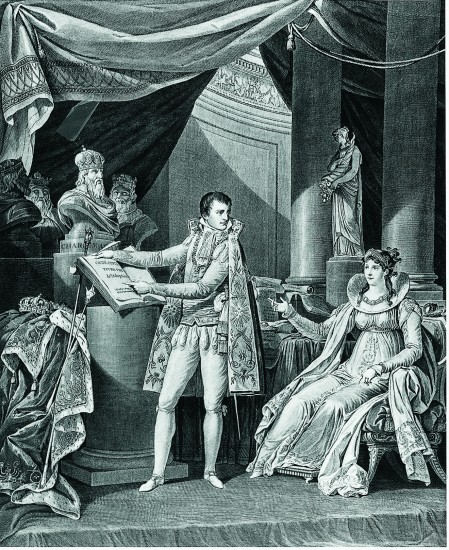On various occasions, during conversations with his companions in exile on St Helena, Napoleon answered this question himself. According to him, “his” code, in other words, the ‘Code civil’ (or the Napoleonic Code) would remain the primary contribution his reign made to the well-being of France, adding: “as a result of its simplicity, [it] has done more good in France than the mass of laws that preceded it”.
On his coming to power, Napoleon set about completing his project to codify civil law, a project often envisaged, occasionally even attempted, but never actually realised. And he launched himself heart and soul into the affair, putting Cambacérès in charge of the dossier (the Second Consul was one of the best jurists of his time), establishing a commission (comprised of Portalis, Tronchet, Bigot de Préameneu and Malleville), and providing the team with the means to bring the project to completion. Four years went by before the thirty-six laws of the Code civil were promulgated on 21 March 1804. This opened the gates for the generalisation of the codification process and the promulgation of the Code de procédure civile (1806), the Code de commerce (1807), the Code d’instruction criminelle (we would say today “Code of Criminal Procedure”, 1808), and the Code pénal (1810). The Napoleonic bicentenaries, though discreet in France, provided an occasion on which to highlight the importance and perennial nature of the laws within the history of French law. However, the laws were only rarely put in context or compared with the views of the society which had promoted them, beginning with Napoleon himself. And yet, this Napoleonic project of codification played a role in the redefinition of the organisation of society around the principles of 1789.
Those principles remained almost untouched as far as the Code civil was concerned, namely, equality of all citizens before the law, the non-confessional nature of the state (first step on the road to what they call in France today ‘laïcité’), family and inheritance law, freedom of contracts, and the establishment of property as an absolute, perpetual right. Another often forgotten feature is that the promoters of the Code proclaimed their faith in jurisprudence. That was why they wrote short, clear, simple articles, leaving it up to the courts to detail the precise consequences and to allow the laws room for evolution as society evolved… whilst leaving the general framework in place. Viewing Napoleonic order through the prism of the codes, and more specifically ‘THE’ code, it becomes clear that it was not just a question of preserving law and order. Napoleonic order was not simply the opposite of disorder but rather a project which had emerged as a reply to a sort of general consensus within French society of the period. For Napoleon and his team, the preservation of order meant in fact the defence of the values and interests that structured society. It was a project directly related to the views expressed by Pierre-Louis Roederer in the Journal d’économie publique published on 27 August 1796: “Order is the wisdom of nature; it is the product of diverse elements which it embraces in its immensity; but it ensures also its force, its grandeur, indeed its very immensity”.
During the next seventy years, none of the successive regimes saw any need to reform the code, despite the collapse of rural society and the effects of the industrial revolution. However, after a few minor modifications made during the Second Empire, it was the Third Republic which thoroughly modernised the code, notably with reference to the juridical capacity of married women (laws dated 1938 and 1942), and the Cour de Cassation was to make ever broader interpretations of the original dispositions… thereby however respecting the intentions of those who drew up the code in the first place. The changes since 1945 have been even greater and made in almost every single domain. And yet, still today, more than half of the articles in the Code are those formulated in 1804.


